Haga clic aquí para español
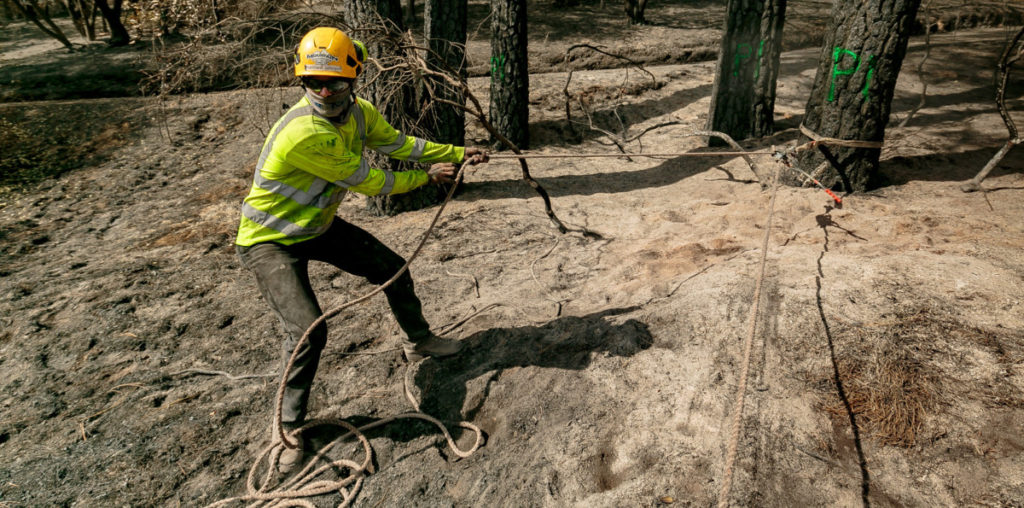
Matthew Johnson ropes a burned tree in the Bear Fire zone.
In early September, the Bear Fire – also known as the North Complex Fire – tore through Butte county, decimating entire communities and leaving a path of devastation in its wake.
In the densely wooded fire zone, the countless damaged and charred trees make clean-up and restoration work exceptionally dangerous and difficult, so several IBEW 1245 line clearance tree trimmers from Mountain Enterprise were quickly called in to deal with the arduous but essential task of clearing the vegetation.
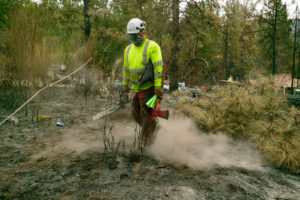
Hazard Tree Foreman Haley Wike
“We’ve got hazard trees everywhere — Trees that are burnt, that are a hazard to the public, to the lines, to PG&E hardware, and that’s why we’re here, taking them out,” IBEW 1245 member and Mountain Enterprise Hazard Tree Foreman Haley Wike explained.
When the Utility Reporter caught up with Wike and his crew, they were working in Feather Falls, one of the hardest-hit towns in the Bear Fire zone.
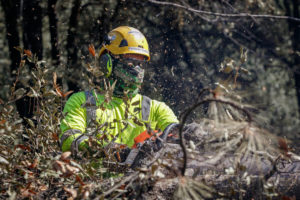
Fernando Contreras cuts brush after falling a tree.
“Everything is burned up here. There are some spots that are hotter than others, but the area we’re in right now is definitely burnt,” said Wike. “There are only a couple of homes left on this road that I’ve seen so far. It’s pretty tragic.”
Wike and his crew went straight to work, carefully and meticulously removing any damaged trees that present a threat to people, power lines, or other PG&E assets – while simultaneously looking out for themselves and one another.
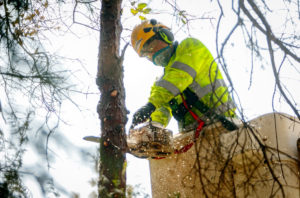
Foreman Adan Aguilar
“Safety is our number one [priority] out here, because it’s so dangerous. The heat’s a challenge, the hazard trees are a challenge. There’s not too much of this job that isn’t a challenge, to be honest,” said Wike. “So we try to focus on safety at Mountain Enterprise. That’s our number one goal, to keep each other safe and keep the public safe.”
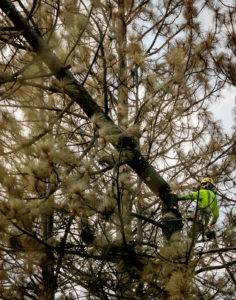
Eugene Neighbor does a back cut on a tree.
Line clearance tree trimming – especially in a fire zone — isn’t everybody’s cup of tea. It’s hot, strenuous, and requires precise attention to detail; even one small misstep could have a deleterious result.
“You either love it or you hate it. I’m just one of those guys who love it,” said Wike. “It’s challenging. It’s physically demanding. It’s a lot of fun in a lot of ways, and just keeps you on your toes. It’s not one of those jobs where the time drags, the time goes by pretty fast.”
Wike appreciates having union representation on the job, and he’s especially grateful for the benefits he gets through the collective bargaining agreement.
“I have a family of a six and the benefits are huge, not to mention the pay increase that just went through earlier this year,” he said.
Photos by John Storey
En la zona de incendios, densamente boscosa, los innumerables árboles dañados y carbonizados hacen que el trabajo de limpieza y restauración sea extremadamente peligroso y difícil, por lo que varios podadores de árboles para el despeje de líneas de IBEW 1245 que trabajan para Mountain Enterprise fueron llamados rápidamente para hacer frente a la ardua pero esencial tarea de limpiar la vegetación.
“Por todas partes hay árboles que representan un peligro — árboles quemados que son un peligro para el público, para las líneas eléctricas y para los equipos de PG&E, y por eso estamos aquí, sacándolos”, explicó Haley Wike, miembro de IBEW 1245 y Capataz de Árboles Peligrosos de Mountain Enterprise
Cuando Utility Reporter alcanzó a Wike y su cuadrilla, estaban trabajando en Feather Falls, una de las ciudades más afectadas de la zona del incendio Bear.
“Todo aquí está quemado. Hay algunos sitios más calientes que otros, pero el área en la que estamos ahora está definitivamente quemada”, dijo Wike. “Por lo que he visto hasta ahora, solo quedan un par de casas en esta carretera. Es muy trágico.”
Wike y su cuadrilla comenzaron inmediatamente a trabajar, quitando cuidadosa y meticulosamente cualquier árbol dañado que presente un peligro para las personas, las líneas eléctricas, u otros activos de PG&E – mientras que al mismo tiempo se cuidaban a sí mismos y entre sí.
“La seguridad es nuestra prioridad número uno aquí, porque esto es muy peligroso. El calor es un desafío, los árboles peligrosos son un desafío. Honestamente, casi no hay nada en este trabajo que no sea un desafío”, dijo Wike. “Por eso en Mountain Enterprise tratamos de centrarnos en la seguridad. Ese es nuestro objetivo número uno, mantenernos seguros unos a otros y mantener seguro al público”.
La poda de árboles para el despeje de líneas, especialmente en un área de incendios, no es un trabajo para cualquiera. Hace calor, es agotador, y requiere una atención precisa a los detalles; un pequeño error podría tener consecuencias nocivas.
“O te encanta o lo odias. Yo soy uno de esos a quienes le encanta”, dijo Wike. “Es retador. Exige un gran esfuerzo físico. Es muy divertido en muchos sentidos, y te mantiene alerta. No es uno de esos trabajos en los que el tiempo se hace eterno, el tiempo pasa muy rápido.”
Wike aprecia tener representación sindical en el trabajo, y está especialmente agradecido por los beneficios que obtiene a través del acuerdo de negociación colectiva.
“Tengo una familia de seis y los beneficios son enormes, sin hablar del aumento salarial que acabamos de recibir a principios de este año”, dijo.